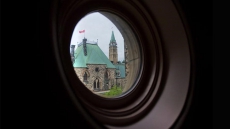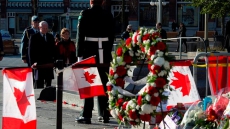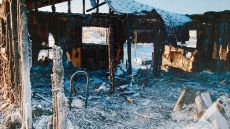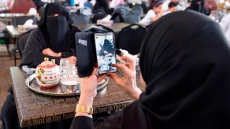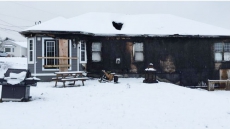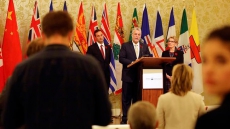Amazingly, the restoration of diplomatic relations with the United States and the sea of potential consequences that opens up appeared not to be the biggest news story in Cuba.
The country's most famous newspaper trumpeted a very narrow component of that story Thursday. So did the folks onstage at Havana's jazz festival.
The big news was the prisoner swap that sent home the so-called Cuban Five. Treated as national heroes for years, the convicted spies returned to a celebratory welcome and a group photo with President Raul Castro decked out in olive-green military garb.
The communist party organ, Granma, splashed that photo across a front-page story with a quasi-biblical tone: "The Cuban sky, which they dreamt so much to see, was the first to welcome back our heroes. Then it was the sound of the breeze, this feeling of liberty... Eleven million multiplied tears were shed as (Castro) gave the news."
The paper ran transcripts of the previous day's speeches by both the U.S. and Cuban presidents, both of whom thanked Canada and the Vatican for helping with negotiations.
Castro's speech, however, emphasized the return of the spies, arrested 16 years ago in connection with helping the Cuban military shoot down two small planes, then added in parentheses a detail about a shift in a 53-year policy: "Also, we agree to the restoration of diplomatic relations."
The reaction was similar at the art-deco theatre hosting the Havana jazz festival.
In honour of Cuba's patron saint, Lazarus, a jazz band played a riff off a classic song about Babalu — the Santeria pagan spirit associated with the saint. Someone onstage mentioned the Cuban Five, prompting cheers. The master of ceremonies later brought the crowd to its feet for a standing ovation.
"'Today is so special because of the return of The Five, and the opening of negotiations with the United States,'" one of the festival-goers, Susan Jackson, quoted the MC as saying.
"For the Cubans, the first issue right now is people talking about, 'the return of The Five, the return of The Five'.... I don't think most people here have much concept of what re-establishing relations means."
But Jackson has a few ideas.
She holds a unique vantage point as an American who's lived in Cuba for two decades — spending nearly half the year there and the other half back home in upstate New York.
The diplomatic freeze between her native and adoptive countries has posed a litany of logistical challenges in everyday life for the 73-year-old retired schoolteacher:
— She can't access her U.S. bank account in Cuba, so she relies on a Canadian one — Scotiabank. In an interview Thursday, she repeatedly expressed gratitude to Canada for sticking with Cuba through the years and for, more recently, offering to host the U.S.-Cuba negotiations.
— Trips home can be stressful. Each year, she flies through Canada. Then she travels by land to the U.S. border, worrying about having her passport revoked or her husband's U.S. green card cancelled. Jackson says she never lies to the customs agents, but doesn't volunteer unnecessary information: "They'll say, 'Oh, you have such a nice tan' — and I'll say, 'Thank you, bye!'"
— She struggles to get information from the outside world. A self-professed news junkie, Jackson said she's currently reading a two-week-old copy of the Globe and Mail she recently got her hands on. She also manages to score a few staticky minutes each day of Fox News on the TV in her Old Havana apartment.
— To check emails, she'll head out to a hotel once in a while and pay $10 an hour for Internet access. That's about a week's salary for a Cuban physician, and more than four times the entire $2.30-a-month pension her Cuban husband Rafael, a jazz saxophonist, receives from the state.
Jackson hopes some of these things might change.
The deal announced this week specifically mentioned U.S. telecommunications companies building infrastructure; bigger international cash transfers, and access to American banking institutions from the island.
"I'm thrilled. And I really give thanks to Obama, the Pope, Raul, Canada — everybody who was involved," she said, comparing the news to springtime after a very bleak, long period following the loss of financial support from the old Soviet Union. "I think most Cubans are very, very pleased."
She said she heard similar gratitude at Wednesday night's jazz show: "People were mentioning that — 'Canada and the Pope.'"
Still, a prominent Cuban dissident expressed mixed emotions.
Yoani Sanchez, writing in a blog, said it was far too early to uncork the champagne and scream, "Viva Cuba Libre," especially because the U.S. hadn't extracted any major concessions from the Castro regime.
She did see cause for optimism that Cuban politics will change.
"Because the Cuban system is supported — as one of its main pillars — by the existence of a permanent rival. David can't live without Goliath and the ideological apparatus has depended too long on this dispute."
